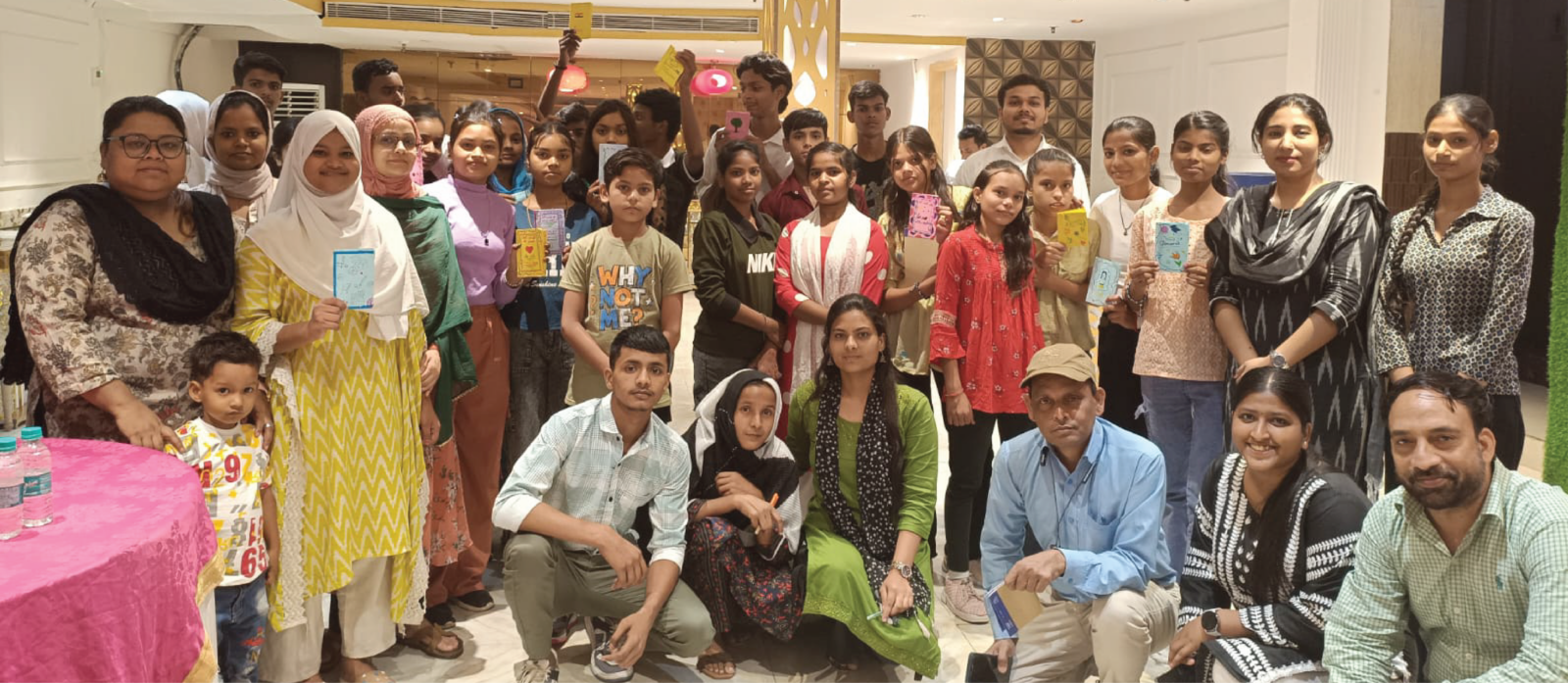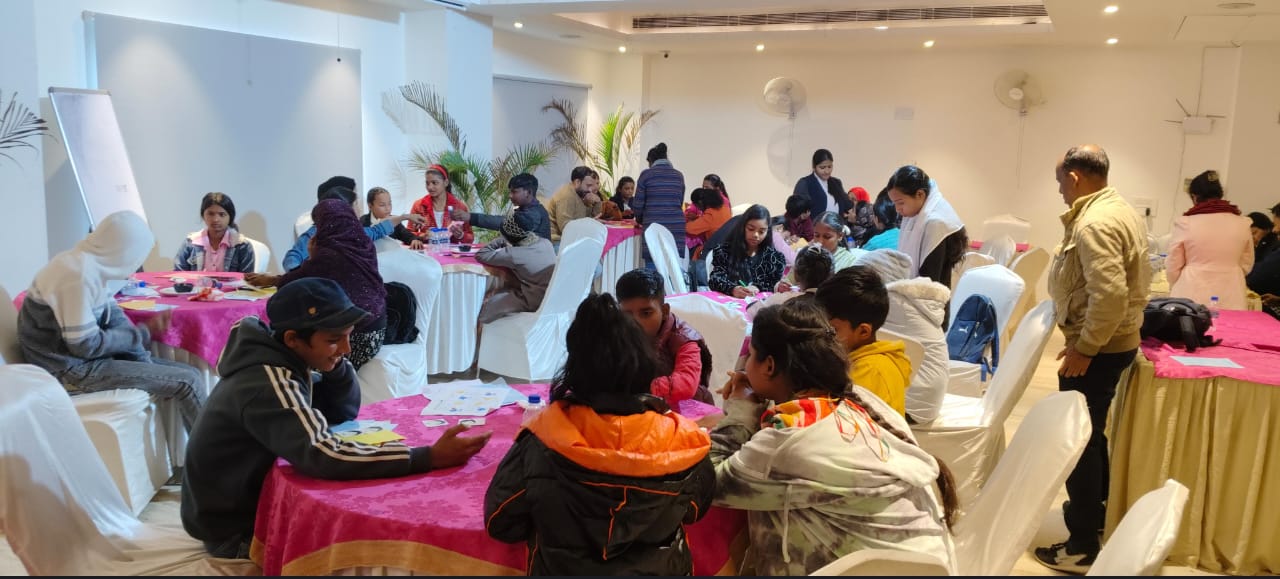For children growing up in challenging circumstances, knowing how to read or write is not always enough. They also need the skills to navigate the world around them; skills like confidence, decision-making, empathy, and communication. These are essential life skills.
Life skills empower children to stand up for themselves, say “no” to unsafe situations, express their emotions, and make informed choices about their future. In communities where children are often exposed to neglect, exploitation, or the pressure to drop out of school, life skills can be the difference between vulnerability and self-agency.
Keeping their unique needs in mind, Railway Children India (RCI) introduced a comprehensive life skills and soft skills programme designed to equip them for the real world.
Building Life Skills from the Ground Up
Launched across six communities and reaching over 270 children, the programme is grounded in the World Health Organisation’s 10 essential life skills. The sessions are interactive, age-appropriate, and activity-based. With these sessions, our goal is to equip children with vital skills to:
- Think critically and creatively
- Communicate with confidence
- Make informed decisions
- Set personal goals
- Manage stress and emotions
- Understand themselves and others
- Build empathy, resilience, and interpersonal strength
In some communities, karate training is also included, adding physical confidence and self-defence to the curriculum.
Linking Skills to Livelihood
As the sessions progressed over the year, our team observed a crucial insight: young adults, many of whom were past school-going age, wanted more than just awareness; they wanted skills that could lead to a livelihood.
In response, RCI began linking youth to vocational training partners offering:
- Beautician courses
- Tailoring and stitching
- Basic computer education
This integration ensures that life skills are not taught in isolation but are connected to real-life goals and aspirations.
A Unique Peer-Led Model Leads the Way
What makes this programme unique is its Peer-Led Model.
This inclusive and participatory model begins with our training officers training a select group of peer leaders during day-long workshops. These leaders then go back to the community, spearheading their respective adolescent boys and adolescent girls’ groups, where they employ some of the activities they learnt in the session to deliver similar lessons on life skills—all under the supervision of our community mobilizers.
Using tools like role play, storytelling, group discussions, and games, the sessions are designed to be both engaging and reflective. When describing this peer-led approach, Ms. Tawakkul Khan, Program Officer at Railway Children, says, “the goal is not just to teach them skills.”
“It’s to make them believe in themselves.”
Witnessing Real Change
Before these sessions, many children were withdrawn, unsure of themselves, and unaware of their emotions or aspirations. Today, they raise hands, ask questions, and speak with clarity about their goals.
“Earlier, they didn’t even know what triggered their anger. Now they understand what they feel and how to manage it,” Ms. Khan shares.
Echoing the sentiment, Ms. Aisha Shamim, Training Officer, describes a moving incident, which represents the monumental impact of safe spaces and guided training in life skills.
“I was conducting a session on bullying with the adolescent boys and girls in the Darbhanga community when a 13-year-old boy raised his hand. He lives with fibrodysplasia, a rare genetic condition where bones form and grow uncontrollably.”
With quiet courage, he shared “Main sochta hoon mera munh aisa kyun hai… Kabhi-kabhi lagta hai, mar jaaun.” (“I wonder why my face looks like this… Sometimes, I feel like dying.”)
“I had no words for a few seconds. My eyes welled up as I looked around the room, even the other boys had tears, wiping them silently. It was one of those moments where you realise the power of creating safe spaces.”
“We began the session talking about the impact of bullying, but we ended up creating a support group. Right there, in that moment, 9–10 boys made a promise: they would not only stop bullying, they would become his support system.”
Breaking Gender Norms, Building Equality
Gender inclusivity is woven into every aspect of the programme. Sessions often bring boys and girls together in a safe space where honest conversations unravel. Right from shared household responsibilities to boys learning non-traditional skills like stitching, no topic is left unattended.
This approach not only builds respect but also challenges the deeply embedded stereotypes that can limit young minds.
The Most Transformative Skill? Self-Awareness
When asked to name the one skill that creates the biggest shift, Ms. Khan doesn’t miss a beat: self-awareness. “Once children understand their strengths, weaknesses, and dreams, everything changes. They begin to make choices that align with who they truly are.”
Children once unsure of their place in the world are now stepping up as peer leaders, problem solvers, and dreamers. All they needed was a space to reflect, a voice to express, and a hand to guide. And that’s exactly what Railway Children India’s Life Skills Programme offers. As Ms. Shamim puts it, “Our goal is not to just give answers, but help children start asking the right questions.”
And perhaps, that’s the most powerful life skill of all.








